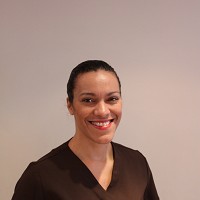Fascial Stretch Therapy
Fascial Stretch Therapy (FST) is a form of assisted stretching, that is performed with the client lying on a massage couch. Unlike other stretching techniques, FST starts at the joint capsule and focusses on stretching the muscles and the fascia in multiple planes, rather than just muscles.
Search AgainRead More About Fascial Stretch TherapyVerified

Ros Ivison - Fascial Stretch Therapist
I am primarily a Structural Integration Practitioner, but also practice Frederick Stretch Therapy™ and Rossiter Stretching.
I am passionate about the work that I do and enjoy helping people to find solutions to their pain and resolve health issues generally.

Rebecca Geanty - Fascial Stretch Therapist
Rebecca is an Acupuncturist specialising in Fertility and Women's Health. She is also the Director of Treat-Norwich which is a warm, welcoming multi disciplinary Clinic in Norwich. Rebecca is truly passionate about her work. Your wellbeing is top of her list. After experiencing the relief of headaches through Acupuncture Rebecca trained... [read more]

Ann Kristina Hammond - Fascial Stretch Therapist
We are a well established physio clinic with an excellent reputation conveniently located in the Market Square in Grantham, Lincolnshire.
We specialise in Sports Physiotherapy, Acupuncture, Shockwave Therapy, Neurological Physiotherapy, Orthopaedic Physiotherapy , Cranio-sacral Therapy, Osteopathic techniques, Chiropractic techniques, Reflexology, Bowen Therapy, Sports Massage, Remedial Massage, Occupational Health and... [read more]
Fascial Stretch Therapy (FST) is a form of assisted stretching, that is performed with the client lying on a massage couch. Unlike other stretching techniques, FST starts at the joint capsule and focusses on stretching the muscles and the fascia in multiple planes, rather than just muscles.
Fascial Stretch Therapy (FST) is a form of assisted stretching, that is performed with the client lying on a massage couch.
Unlike other stretching techniques, FST starts at the joint capsule and focusses on stretching the muscles and the fascia in multiple planes, rather than just muscles.
It was founded by Ann Frederick initially, with her husband Chris becoming the co-founder.
Ann has a background in ballet and Chris is a Physical Therapist.
Ann worked with a lot of athletes, helping them stretch for optimum performance. Following this and through a lot of research, Fascial Stretch Therapy was formulated into the therapy that is now taught.
The first research into the effects of FST commenced in 1997 with founder Ann Frederick’s thesis. Current research on the effects of FST on chronic low back pain has been completed with a team at the University of Arizona Medical School in Phoenix. FST is based on extensive science resources.
A typical FST session can last from 60 to 90 minutes. An initial consultation is followed by an assessment with the client lying on the couch and then the stretching session will commence.
Clients might seek FST treatment for help with aches and pains and to help improve posture and flexibility. Sessions at monthly intervals might be suggested for maintenance, but could be as much as once every two weeks for a while, depending on what problems a client presents with.
Fascial Stretch Therapists are all trained and certified at the Stretch to Win Institute in Arizona and are listed on the Stretch to Win website. All practitioners will have their own practitioner insurance and relevant bodies that they belong to, that is relevant to their country of practice.
A level 1 certified practitioner is a good general stretch therapist who will perform a good all round upper and lower body assisted stretching session.
If a client has slightly more stubborn problems, then they should seek treatment from either a level 2 or a level 3 certified FST practitioner. Level 3 practitioners are qualified in either the Medical or Fitness specialism. The medical specialism is designed for bodyworkers and others who do hands on work, with the Fitness specialism being designed for movement therapists, such as personal trainers and yoga and pilates instructors.




